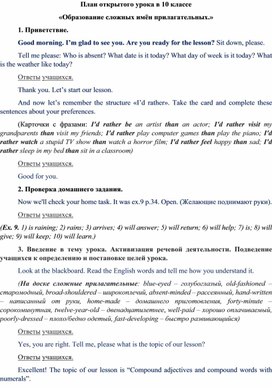План-конспект "Образование сложных прилагательных" 10 класс

План открытого урока в 10 классе
«Образование сложных имён прилагательных.»
1. Приветствие.
Good morning. I’m glad to see you. Are you ready for the lesson? Sit down, please.
Tell me please: Who is absent? What date is it today? What day of week is it today? What is the weather like today?
Ответы учащихся.
Thank you. Let’s start our lesson.
And now let’s remember the structure «I’d rather». Take the card and complete these sentences about your preferences.
(Карточки с фразами: I'd rather be an artist than an actor; I'd rather visit my grandparents than visit my friends; I'd rather play computer games than play the piano; I'd rather watch a stupid TV show than watch a horror film; I'd rather feel happy than sad; I'd rather sleep in my bed than sit in a classroom)
Ответы учащихся.
Good for you.
2. Проверка домашнего задания.
Now we'll check your home task. It was ex.9 p.34. Open. (Желающие поднимают руки).
Ответы учащихся.
(Ex. 9. 1) is raining; 2) rains; 3) arrives; 4) will answer; 5) will return; 6) will help; 7) is; 8) will give; 9) will keep; 10) will learn.)
3. Введение в тему урока. Активизация речевой деятельности. Подведение учащихся к определению и постановке целей урока.
Look at the blackboard. Read the English words and tell me how you understand it.
(На доске сложные прилагательные: blue-eyed – голубоглазый, old-fashioned – старомодный, broad-shouldered – широкоплечий, absent-minded – рассеянный, hand-written – написанный от руки, home-made – домашнего приготовления, forty-minute – сорокоминутная, twelve-year-old – двенадцатилетнее, well-paid – хорошо оплачиваемый, poorly-dressed – плохо/бедно одетый, fast-developing – быстро развивающийся)
Ответы учащихся.
Yes, you are right. Tell me, please what is the topic of our lesson?
Ответы учащихся.
Excellent! The topic of our lesson is “Compound adjectives and compound words with numerals”.
4. Основная часть.
Open your books at page 31 and 35. (Читаем правило с.31, 35)
Page 36 ex. 3
1) My little sister is an eight-year-old girl. (Моя сестренка – восьмилетняя девочка).
2) Mr Jackson was a proud-looking sixty-year-old gentleman. (Мистер Джексон был уважаемым шестидесятилетним джентльменом).
3) Our teacher is a forty-six-year-old woman, tall and good-looking. (Наша учительница – сорокапятилетняя женщина, высокая и привлекательная).
4) There were two ten-year-old children among the tourists. (Среди туристов было двое десятилетних детей).
5) It’s not easy to explain such difficult things to a five-year-old child. (Нелегко объяснить такие сложные вещи пятилетнему ребенку).
6) Ours was an old thirteen-year-old dog. (У нас была старая тринадцатилетняя собака).
7) When we met, Samuel was a twenty-one-year-old young man. (Когда мы встретились, Сэмюель был двадцатиоднолетним юношей)
Let’s read the new words. Ex. 5. (Упр.5-6 с 36-37)
So, ex. 6.
1. a key (ключ);
2. The income he had... (его доход);
3. raised (поднял);
4. a single day (один день);
5. does not tend (не склонен);
6. research (исследование);
7. is capable to (способен);
8. According to the article (согласно статье);
9. the bare necessities (насущные нужды);
10. Senior citizens (пожилые люди).
Let’s remember the Future in the Past Tense
Время будущее в прошедшем обозначает действие, которое произойдет в будущем с точки зрения момента в прошлом. Иначе говоря, Future in the Past – это когда в прошлом говорят о чем-то, что произойдет в будущем. Эта форма употребляется в придаточных предложениях после глаголов (в прошедшем времени):
· say – говорить,
· tell– говорить,
· know – знать,
· believe – верить, полагать,
· hope – надеяться.
· и др.
Все формы будущего в прошедшем, образуются так же, как и формы будущего времени с единственной разницей – глагол will заменяется на would.
(Карточки с заданием)
Complete the sentences using the verbs in brackets either in future simple or in future-in-the-past. Ready?
1) I (take) an umbrella if it rains. (I will take an umbrella if it rains.)
2) Dear John, I’m writing to tell you I (be) in Liverpool next Thursday. (Dear John, I’m writing to tell you I will be in Liverpool next Thursday.)
3) I thought you (be) happy if I gave you this ring as a gift. (I thought you would be happy if I gave you this ring as a gift.)
4) Do you think it (snow) tomorrow? (Do you think it will snow tomorrow?)
5) They promised they (send) me an e-mail when they arrived. (They promised they would send me an e-mail when they arrived.)
6) We’re lost. I (stop) and ask the way. (We’re lost. I will stop and ask the way.)
7) I would like you to repeat your reasons, perhaps he (understand) you. (I would like you to repeat your reasons, perhaps he will understand you.)
8) I thought you (visit) your granny tomorrow. (I thought you would visit your granny tomorrow.)
9) We were sure he (win). (We were sure he would win.)
10) I hope my parents (give) me a new iPad as a birthday present. (I hope my parents will give me a new iPad as a birthday present.)
Good for you.
It’s time to give you the homework. Now open your daybooks and write down Ex.8,10 p.38 in written.
And now let’s try to make some conclusions. I am quite satisfied with your work at the lesson today. What emotions do you feel? Please take the pictures and show it.
It’s fine!
Well, our lesson is over. Thank you for it. Goodbye!
Скачано с www.znanio.ru
© ООО «Знанио»
С вами с 2009 года.
![]()

